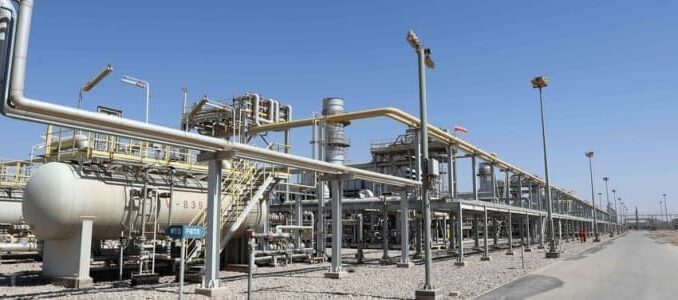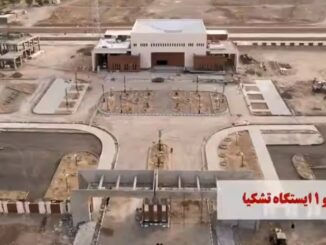
- The Mansuriya field, holds an estimated 4.5 trillion standard cubic feet of gas and is expected to produce around 300 million scf per day of gas at its peak.
- For China, the location of the Mansuriya gas field fits perfectly into the vast network of oil and gas sites in Iraq.
- According to industry figures, more than a third of all Iraq’s proven oil and gas reserves and over two-thirds of its current production are managed by Chinese companies.
The awarding last week of the exploration and production (E&P) contract for Iraq’s second biggest gas field to a Chinese consortium comprising two of its relatively unknown firms rounds off a spectacular month of success for Beijing in tightening its hold over Baghdad. It follows a slew of new ‘fifth-plus’ and sixth oil and gas licensing concessions its companies won in the past two weeks across the country, from north to south and from east to west. For China’s Jereh Group (comprising one half of the consortium), the achievement is even more remarkable, as this enormously lucrative prize will mark its first ever E&P work in Iraq. Petro Iraq’s award, meanwhile, perhaps even more underlines how little interest Iraq fundamentally has in allowing the U.S. back into the country in any meaningful way. According to a senior source who works closely with Iraq’s Oil Ministry and exclusively spoken to by OilPrice.com last week, Petro Iraq is an umbrella organisation comprising elements of the China National Offshore Oil Corporation and of engineering interests owned by Khatam al-Anbiya Construction Headquarters, which is controlled by Iran’s Islamic Revolutionary Guard Corps. For China more broadly, the location of the Mansuriya gas field fits perfectly into the vast network of oil and gas sites in Iraq over which it has established dominance since the U.S. ended its combat mission in the country on 9 December 2021.
In practical energy terms, the Mansuriya field, holds an estimated 4.5 trillion standard cubic feet (scf) of gas and is expected to produce around 300 million scf per day of gas at its peak, although production will start running at about 100 million scf within 18 months. The contract is set to run for 25 years, but it can be extended for an additional five years or longer, and these numbers place it just behind the Akkas field in Iraq’s gas site hierarchy. However, it has a geographical and geopolitical importance far greater than its gas reserves. In this context, Mansuriya is one of the three big sites that form a skewed triangle across Iraq, located very close to the eastern border with Iran, with the Siba field to the south (extremely close to the key Iraqi Basra export hub), and the Akkas field all the way west (extremely close to the border with Syria). Along the spine of this entire area running from east to west are the historically ultra-nationalist and ultra-anti-West cities of Falluja, Ramadi, Hit and Haditha. At that point, Iraq turns into Syria, and it is just a short hop to the key strategic ports of Banias and Tartus, and then to Latakia – all three of which are globally strategic sites for Moscow and Beijing, as analysed in full in my new book on the new global oil market order.
Suffice it to say here, Russia has an expanding and ongoing presence in the Syrian port of Tartus, which remains one of its huge naval bases and the only Mediterranean port to which it has full access. The port is just a short ride from Khmeimim airport, which – under a deal struck in 2015 – became a dual-use civilian-military airport-airbase for use by Russia. And just a short flight away from those two key assets is Russia’s Latakia intelligence-gathering listening station. China benefits from the intelligence gathered by its key global partner and is also supportive of ongoing efforts to build-out a ‘land bridge’ from Tehran to the Mediterranean Sea by its key Middle Eastern partner, Iran. This could exponentially increase the scale and scope of weapons delivery into southern Lebanon and the Golan Heights area of Syria to be used against Israel and the U.S. in Middle Eastern conflicts. The core aim of this policy is to be able to provoke a broader conflict in the Middle East that would draw in the U.S. and its allies into an unwinnable war of the sort seen recently in Iraq and Afghanistan. For China, such a broader conflict in tandem with Russia’s current (or next) conflict in eastern Europe, would make it more difficult for the U.S. and its NATO allies to react to a simultaneous invasion of Taiwan.
Having said this, China also wants to secure its hold over Iraq in order to use its huge and relatively untapped oil reserves to power its economic growth into the future. Along with Iran and Saudi Arabia, Iraq’s oil is the cheapest to extract anywhere in the world, with an average lifting cost of just US$1-2 per barrel (pb). Beijing also negotiated discounts of 30 percent or more on oil and gas it buys from Iraq under the terms of the 2019 ‘Oil for Reconstruction and Investment’ agreement, which was later expanded into the 2021 ‘Iraq-China Framework Agreement’, as also thoroughly examined in my new book. Officially, Iraq still has around 145 billion barrels of proven crude oil reserves, around 8 percent of the world’s total. However, at the same time as producing these official reserves figures, the Oil Ministry stated that the country’s undiscovered resources amounted to around 215 billion barrels. However, in a full analysis conducted in 2012, the International Energy Agency (IEA) put the level of Iraq’s ultimately recoverable resources at around 246 billion barrels (crude and natural gas liquids). Officially as well, Iraq’s gas reserves currently total about 3.5 trillion cubic metres (tcm), or about 1.5 percent of the world total, with around three-quarters of these comprising associated gas. Unofficially, though, in its thorough 2012 analysis, the IEA estimated a truer figure at above 8.0 tcm, with non-associated gas estimated to be at least 30 percent of this number.
The terms of the ‘Iraq-China Framework Agreement’ also allows China great scope to build out corollary infrastructure across the country. One notable case in point was the awarding in 2021 to China of contracts to build a civilian airport to replace the military base in the capital of the southern oil rich Dhi Qar governorate. This region includes two of Iraq’s potentially biggest oil fields – Gharraf and Nassiriya – and China said that it intended to complete the airport by 2024. This project would include the construction of multiple cargo buildings and roads linking the airport to the city’s town centre and separately to other key oil areas in southern Iraq. In later discussions connected to the 2021 ‘Iraq-China Framework Agreement’, it was decided that the airport could be expanded later to be a dual-use civilian and military airport. The military component would be usable by China without first having to consult with whatever Iraqi government was in power at the time, a senior source who works closely with Iraq’s Oil Ministry exclusively told OilPrice.com at the time.
Overall, according to industry figures, more than a third of all Iraq’s proven oil and gas reserves and over two-thirds of its current production are managed by Chinese companies. Given this foundation, it will be interesting to see how long Beijing waits to bring pressure on Baghdad to re-assign the last part of the skewed Siba-Mansuriya-Akkas triangle in Iraq to one of its firms. The award of the Mansuriya contract to its consortium complements the presence of its Anton Oilfield Services Group and China Petroleum Engineering on the Siba field, and it did not expect the recent award of the Akkas contract to go to the previously little-known Ukrainian firm, Ukrezemresurs. According to the Iraq source spoken to by OilPrice.com, it was made very clear to Iraq during the recent visit to Washington of Prime Minister Mohammed Al Sudani that financial disbursements and waivers to keep importing energy from Iran would be heavily scrutinised if Akkas was awarded to Russia, or to any companies from China or Iran. “But the situation is different now,” said the source, “as Iraq got what it wanted and there’s now talk in the [Oil] Ministry that it [Ukrezemresurs] will not be capable of doing the job, so a change may happen here [on the Akkas contract] soon.”





